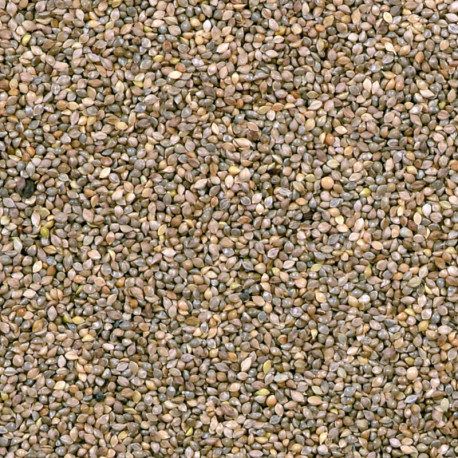



Reference: 564-KG
This seed from switchgrass is rich in protein (12.6%) it also contains 60% carbohydrates and less than 5% fat.
It is the richest variety of millet in protein. Japanese millet is recommended to all breeders of exotics, natives, parakeets, large parakeets.
This seed from switchgrass is rich in protein (12.6%) it also contains 60% carbohydrates and less than 5% fat.
It is the richest variety of millet in protein. Japanese millet is recommended to all breeders of exotics, natives, parakeets, large parakeets.
Clover stimulates the immune system and slows down cellular ageing through its excellent antioxidant properties. Rich in vitamins B, C, E and provitamin A.
Yellow millet is rich in vitamins and minerals and is an alkaline (non-acidic) cereal. It is part of the basic diet of parakeets, exotic birds and exotic doves.
Millet contains magnesium, phosphorus, iron, potassium, manganese, vitamin A, vitamin B1, vitamin B2, vitamin PP (nicotinic acid) and vitamin B5.
Baked and crumbled wheat biscuit.
Rusk is particularly suitable for the absorption of moistened food.
Also ideal for mixing additives (vitamins, dyes, etc.) in food products
Ideal for moistening egg pie.
Composition: wheat, water, salt and yeast.
Properties of Pine or Larix seeds.
Anti-inflammatory, analgesic, antispasmodic,
Antiseptic, anti-infectious (pneumococci),
Decongestant of the small pelvis and prostate,
Diuretic
Expectorant, tonic for the respiratory organs.
Yellow millet is rich in vitamins and minerals and is an alkaline (non-acidic) cereal. It is part of the basic diet of parakeets, exotic birds and exotic doves.
Millet contains magnesium, phosphorus, iron, potassium, manganese, vitamin A, vitamin B1, vitamin B2, vitamin PP (nicotinic acid) and vitamin B5.
Onion seeds are rich in minerals, vitamins, and antioxidants.
Thanks to its small black or pretty electric blue seeds, the poppy is recognizable among thousands. A cousin of the poppy, the poppy is known for its content of good fats and micronutrients essential for the proper functioning of the body.
Turnip is almost similar to rapeseed, the difference is the more bitter flavor of the latter. Turnip seed is rich in protein and favourable to the improvement of song, so it is interesting during the breeding season in canaries.
A type of seed with a mild taste and high protein content. They are also high in fat.
This seed is quite fatty, we advise you not to exceed 10% of your shuttle mix for colored canaries or posture canaries.
For singing canaries, the shuttle softens the song and can therefore be used at 30% of the mixture: in the latter case, we advise you to accompany your bird's diet with liver support.
A 100% natural product that is mixed with breeding or with food; It doubles in size by adding water.
Carrots are very rich in vitamins with a high proportion of vitamin A and carotene, as well as vitamin B, calcium and valuable carbohydrates.
The thistle-Marie seed has hepatoprotective properties. It is therefore excellent for our birds to avoid liver problems as a preventive measure.

This seed from switchgrass is rich in protein (12.6%) it also contains 60% carbohydrates and less than 5% fat.
It is the richest variety of millet in protein. Japanese millet is recommended to all breeders of exotics, natives, parakeets, large parakeets.
